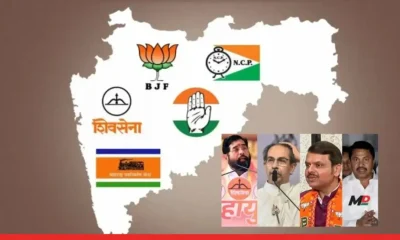Published
6 months agoon

Amidst the ongoing NEET row, a series of shocking confessions have emerged, shedding light on the widespread malpractices that have plagued the medical entrance examination. The Bihar Economic Offences Wing (EOU) has uncovered a disturbing nexus of candidates, brokers, and government officials, all colluding to compromise the sanctity of the exam.
According to the preliminary investigation, NEET aspirants in Bihar were willing to pay exorbitant sums of up to Rs 30 lakh to gain access to the leaked question papers. The suspects have revealed that a well-organized system was in place to facilitate this illegal exchange.
The investigation has unveiled a meticulously planned operation. Candidates were first approached through shady educational consultancies and coaching groups, where they were offered the ‘service’ of obtaining the leaked question papers. Once the financial arrangements were made, the candidates were assembled in safe houses, where they were made to memorize the answers before being dropped off at the examination centers.
This breach of the chain of custody, from the printing firm to the exam centers, was the modus operandi employed by the criminal syndicate. By compromising the staff at these agencies, they were able to gain access to the questions and then systematically disseminate the information to the willing candidates.
So far, the EOU has arrested 14 individuals, including a junior engineer from the Bihar government and a person previously accused in the Bihar Public Service Commission Teacher Recruitment Examination (BPSC TRE) case. The arrests have shed light on the involvement of a well-connected network, with the suspects allegedly charging exorbitant fees for their services.
The revelations have forced Union Education Minister Dharmendra Pradhan to backtrack on his earlier claims of no scope for malpractice or irregularities in the NEET exam. Pradhan has now acknowledged the need to fix accountability and take appropriate action, depending on the nature of the lapses.
The NEET paper leak scandal has not only shaken the confidence of the candidates but has also raised serious questions about the integrity of the exam. The National Testing Agency (NTA), the body responsible for conducting the NEET, has come under scrutiny, with the EOU seeking information and reference question papers from the agency.
The widespread malpractices uncovered in the Bihar case have cast a shadow of doubt over the reliability of the NEET results, with the NTA already having withdrawn grace marks for some top rankers. The sanctity of the exam, which is crucial for determining the future of thousands of medical aspirants, has been severely compromised.
The NEET paper leak scandal has exposed the vulnerabilities within the examination system, highlighting the urgent need for comprehensive reforms. The ease with which the criminal syndicate was able to infiltrate the process and compromise the integrity of the exam points to deeper systemic flaws that must be addressed.
Experts have called for a thorough review of the exam’s security protocols, the vetting of personnel involved in the process, and the implementation of stringent measures to prevent such breaches in the future. The role of the NTA and its accountability in ensuring the fairness and transparency of the NEET exam will also come under intense scrutiny.
The NEET paper leak scandal has far-reaching implications that extend beyond the immediate impact on the affected candidates. The erosion of public trust in the fairness of the examination system could have a domino effect, undermining the credibility of other competitive exams and the overall education landscape.
The incident also raises concerns about the socioeconomic divide, as the ability to afford such exorbitant sums for leaked papers puts underprivileged candidates at a significant disadvantage. This further exacerbates the existing inequities in access to quality education and opportunities.
The NEET paper leak scandal has far-reaching implications for the medical education landscape in India. The credibility of the exam, which serves as the gateway to coveted medical seats, is now under intense scrutiny. This could have a ripple effect on the overall quality of medical education and the future of the healthcare system.
The incident has also raised concerns about the fairness and accessibility of the medical education system, particularly for students from disadvantaged backgrounds. The ability of affluent candidates to circumvent the system through illicit means undermines the principles of merit-based selection and equal opportunity.
As the investigation continues, there are growing calls for greater transparency and accountability from the authorities responsible for conducting the NEET exam. Stakeholders, including student organizations and civil society groups, are demanding a comprehensive and impartial inquiry to uncover the full extent of the malpractices and hold the perpetrators accountable.
The need for robust mechanisms to detect and deter such large-scale exam irregularities has become paramount. Experts suggest that the implementation of advanced technological solutions, such as biometric identification and real-time monitoring systems, could enhance the security and integrity of the examination process.
As the NEET paper leak scandal continues to unfold, there is a growing consensus that the time has come for a comprehensive overhaul of the examination system. Stakeholders, including policymakers, educational experts, and civil society organizations, are calling for a thorough review of the existing processes and the implementation of robust safeguards to prevent such malpractices in the future.
The need for strengthening the oversight and accountability mechanisms within the National Testing Agency (NTA) has become paramount. Experts suggest that the involvement of independent third-party auditors, the implementation of real-time monitoring systems, and the enhancement of data security measures could help restore public confidence in the exam’s integrity.
The NEET paper leak scandal has shaken the very foundations of the medical education system in India. The revelations of widespread malpractices, the involvement of a well-connected criminal syndicate, and the undermining of exam integrity have raised serious concerns about the fairness and transparency of the examination process.
As the investigation continues and the authorities attempt to address the lapses, the onus is on them to rebuild public trust and ensure that the medical education system remains a level playing field for all aspiring candidates. The implementation of robust security measures, enhanced oversight, and a commitment to meritocracy will be crucial in restoring the credibility of the NEET exam and safeguarding the future of medical education in the country.


BJP-Led MahaYuti set to Sweep Maharashtra Assembly Polls; New Government to Take Oath on November 26


Innodata: Championing Gender Diversity, Inclusion, and Equal Opportunity


How do you ensure that your leadership team embodies and models the desired behaviors and culture you want to cultivate?


Avani Lekhara wins gold medal at Paralympics with record-breaking score


Fostering a Culture of Continuous Learning and Development at Drychem


The Lifelong Advantage: Embracing Continuous Learning and Professional Development

